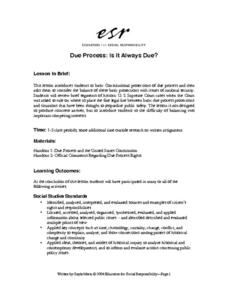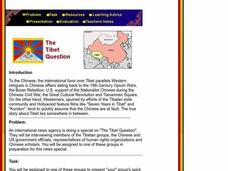Curated OER
Investigating Respect
Students examine prejudice and stereotyping. In this prejudice and stereotyping lesson, students define the words and give examples. They look at pictures of five different people before working in groups to discover their own prejudices...
Curated OER
Stage Directions Lesson Plan
Students examine and discuss stage directions, stage area layout, and body positions. They complete a stage directions and body positions worksheet, and draw the body positions for each stage area layout.
Curated OER
Writing Business Letters of Request
Tenth graders model proper format and elements of business letters. They review effective writing styles and write a request letter. Students also read a short story that includes conflict irony and symbolism They create a chart...
Curated OER
Democracy…Not Yet!
Students analyze the concept of democracy. In this democratic values lesson, students analyze the lyrics of selected popular music that address issues that challenge the role of United States as a world leader. Students create exhibits...
Curated OER
Teaching With Documents Lesson Plan: Photographs of Lewis Hine: Documentation of Child Labor
Young scholars interpret historical evidence presented in primary and secondary resources. In this child labor lesson, students examine photograhs by Lewis Hines and discuss the implications of child labor in America.
Curated OER
Understanding Propaganda
Students define propaganda and give examples from the mass media. In this propaganda lesson plan, students review examples of propaganda and then research versions of it in the mass media.
Curated OER
Building a Nation
Eighth graders identify the main ideas of the U.S. Declaration of Independence. They read and discuss text, read and summarize a section of the Declaration of Independence in small groups, and write a paper on why the colonists felt it...
Curated OER
Chapter 5: Socializing the Individual
In this socializing the individual worksheet, high schoolers respond to 6 multiple choice questions and 14 fill in the blank questions pertaining to how one learns to live within their culture.
Curated OER
Anna Karenina Questions
In this reading comprehension learning exercise, students respond to 7 short answer and essay questions based on Anna Karenina by Leo Tolstoy.
Curated OER
Introduction of the "We the People..." Project and Volunteer Survey
High schoolers complete a survey about their role in volunteering. They research opportunities to volunteer in their community. They identify ways in which the community would be different if no one volunteered.
Curated OER
Argument in an Athenian Jail: Socrates and the Law
Students consider how Socrates might have responded to extenuating circumstances: for example, if his sentence had been imposed by a tyrant rather than in a trial, or if it had been influenced by prejudice.
Curated OER
Due Process: Is It Always Due?
Students explore the basic Constitutional protections of due process and then consider the balance of these basic protections with issues of national security. A variety of segments of U.S. Supreme Court cases are examined in this lesson.
Curated OER
Harassment in the Hallways
Students participants clarify their values, personal beliefs and feelings regarding homosexuality. After reading the provided selection, students discuss their feelings towards homosexuals as well as what constitutes harassment.
Curated OER
The Tibet Question
Students examine the history or relations between China and Tibet. In this research skills lesson, students investigate the relationship between Tibet and China as they explore provided Internet links. Students write position...
Curated OER
I Belong, But Why Don't You?
Students explore discrimination. In this character development instructional activity, students identify groups and organizations to which they belong and the requirements that go with each group. Students discuss inclusion and exclusion...
Curated OER
Looking into Careers: Doing What I Like and Liking What I Do
Students explore careers. For this service learning lesson, students consider the value of job satisfaction and explore non-traditional jobs related to animal welfare.
Curated OER
Using History to Teach Tolerance: A Ripple of Hope
Students investigate the prejudice and racism that has existed in the U.S. for centuries by attending a field trip. In this equality lesson, students visit the Tolerance Museum and discuss the history of the U.S. Students...
Curated OER
Dual Federalism
Students compare and contrast the roles of federal and state governments in the United States. In this government lesson, students research state and national governments' joint and individual powers prior to debating a topic relevant to...
Curated OER
The State Seal Online Lesson
Fourth graders investigate the Seal of the State of California and the meaning of its parts.
Curated OER
Houghton Mifflin Social Studies/Chapter 13, Lesson 1 The Past Shapes the Future (pp. 292-295)
Fourth graders reflect upon the events of the past in order to make cognitive connections to present or future history. Students use Blooms Taxonomy to attain higher levels of thinking.
Curated OER
To Compromise or Not to Compromise: The Missouri Question
Students evaluate the fairness of the Missouri Compromise. They read the Missouri Compromise and discuss how it reflected the North-South, anti-slavery and pro-slavery division in the country. They work in groups to debate the Missouri...
Curated OER
"Julie of the Wolves"
Fifth graders research life in Alaska and compare life there to their lives in this lesson. They read "Julie of the Wolves." They research through the novel and other reference books facts about the Alaskan climate and geography. They...
Curated OER
Study Guide: The Most Dangerous Game
In this study guide for "The Most Dangerous Game" students define vocabulary and literary terms found in the reading. Students also answer reading comprehension questions.
Curated OER
War and the Media Fact Finders: The Media in Times of Crisis
High schoolers explore the role of the media in war reporting. In this information age lesson, students discuss how to find and disseminate factual information. High schoolers consider the source, motive, authority of information.

























